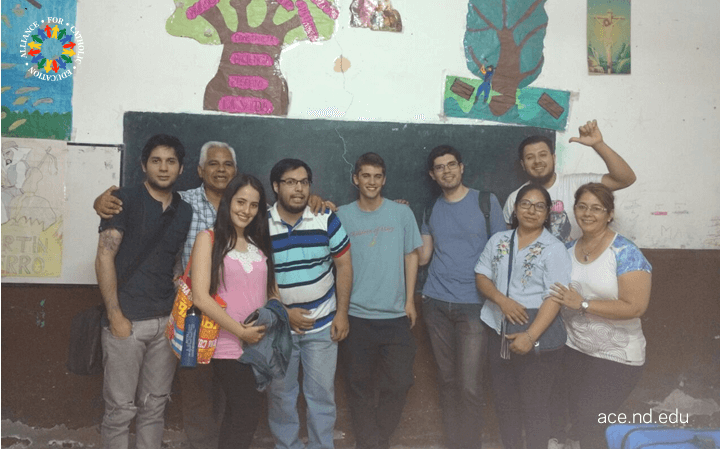During his Fulbright service, Luke Wajrowski's students in Argentina told him that their performance of Twelve Angry Pigs was the first English production they could recall performed in their community. The play, based loosely on Twelve Angry Men, posed frequent logistical challenges, including finding rehearsal space, recruiting student performers, and motivating students to stick with the production. But in the end, the show reflected Wajrowski's commitment to engaging his students in learning English.
"In the end, when we performed it, it was such an accomplishment, not only for me, but for the students, and I remember feeling really proud of all that we did and all of the work that it took to get to that final point," Wajrowski said.
Wajrowski will head to Baton Rouge to teach high school Spanish this fall as a member of ACE 25, and he recently returned after teaching English in Argentina for eight months on a fellowship from the Fulbright U.S. Student Program. But his commitment to engaging students began long before his Fulbright, with a series of volunteer and research commitments in South Bend, Houston, Peru, Nicaragua, and Chile that included work with recent immigrants and English language learners.
Wajrowski's participation in a Notre Dame research project on educational differences between the country's public and private sectors in 2015 motivated him to apply for a Fulbright fellowship. As he visited public and private schools in Nicaragua's capital, Managua, and in Matagalpa, a more rural area, Luke was struck by the disparities between public and private schools' physical resources and instructional qualities. While private schools with smaller class sizes offered engaging and student-driven discussions and activities, public schools, with larger class sizes, required students to learn through lecture formats that Wajrowski found less effective.
"I was frustrated about what I was seeing," he said, describing a visit to a public-school classroom in Matagalpa. "There were no posters, and it was a very bare room, and the school was right next to a really busy street, so you couldn't hear the teacher talking half the time. I just remember thinking [that] I really wanted to go back and make some kind of change here."
In Argentina, Wajrowski taught English as a new language to college students studying to become teachers. He worked at two public tertiary schools called "profesorados," which are roughly comparable to American community colleges, one located in the city of Santiago del Estero in the northern part of Argentina, and one located in a rural area about 30 minutes away. Since both campuses operated as primary schools during the day, Wajrowski taught from 7 p.m. to 11 p.m., rotating between the two campuses throughout the week.
For Wajrowski, one of the most challenging parts of teaching was witnessing how difficult it was for many of his students to graduate. While public education is free in Argentina, students at Wajrowski's schools often dropped out before graduation because it was so difficult to pass their course exams. Although some students could graduate in as few as four years, most took five to six, and some needed as many as 10. It was hard for Wajrowski to watch class sizes drop from year to year, at one school, 60 to 70 students were enrolled in first-year courses, while only 12 students had advanced to the fourth-year course.
To support his students, Wajrowski helped them check assignments, and he gave presentations on American culture to supplement their English language lessons. Larger class sizes in his first- and second-year courses often demanded teacher-focused, test-driven instruction, but Wajrowski looked forward to engaging in discussions with his fourth-year students. In this course, he especially enjoyed a conversation with his students on whether their culture is healthier today than in previous generations, considering factors like mental health problems and increased use of video games and digital technology.
"I think it was really cool for [my students] to see a native speaker, someone from the United States, and to be able to talk about the country," Wajrowski said.
As an ACE teacher, Wajrowski is excited for the rigor of Notre Dame's M.Ed. program and to learn new strategies to engage his students in Baton Rouge. Teaching Spanish, he says, will be much different from teaching English because of the structural variations between the languages.
"That's really my goal from ACE: to become a Spanish teacher long-term. And we'll see if I want to continue with that goal in a couple of years," he said. "I feel like you have to be a champion to do this program."
Learn more about ACE Teaching Fellows at ace.nd.edu/teach
 Alliance for Catholic Education
Alliance for Catholic Education
